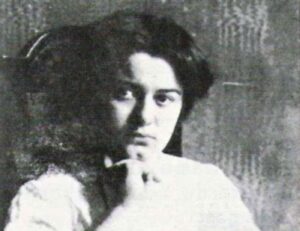We are fascinated by origin stories. In film, these accounts tell the backstory for an already known hero or villain. Prevalent in comic book films (think the recent Joker), we also see iterations of this genre in action movies (James Bond’s Casino Royale) and gangster pictures (The Godfather Part II). Last year, Netflix’s Klaus added its own Santa Claus origin story. In it, Jesper Johannson, the spoiled son of a Royal Postmaster General, is exiled by his father to serve as postman in the remote, northerly island town of Smeerensburg. The father, desperate to instill some responsibility in his son, requires that he establish a functioning mail service—defined as posting six thousand letters in one year—or be permanently cut off from the family dole. Smeerensburg proves desolate and inhospitable, especially to yet another in a string of postmen. Jesper, now himself desperate, eventually joins with a reclusive woodsman named Klaus, who conveniently spent years creating a barnful of toys. Jesper helps to deliver these toys to boys and girls who send letters to Klaus asking for them. The legend of Santa is born.
The film succeeded commercially and critically, though losing out to Toy Story 4 for best animated feature at the Academy Awards. Klaus deserved this success. The film has many merits, including beautiful animation and skillful storytelling, giving a delightful take on Santa’s beginnings. In addition to Kris Kringle, the picture tells another, more important origin story. Instead of persons, this tale concerns political community. Klaus thoughtfully considers what creates and sustains a city. Moreover, it assesses contrasting origins of hatred and grace, contemplating the role reform and tradition can and should play regarding them.
When Jesper arrives in Smeerensburg, he finds a failed state. Smeerensburg’s residents share geographical space. But their commonality ends there. Instead, a perpetual, bitter civil war rages between two clans: the Ellinboes and the Krums. Every thought, every deed seems focused on enmity toward the other family. In practice, Smeerensburg contains two warring political communities, not one. In City of God, Augustine defined a people as “an assemblage of reasonable beings bound together by a common agreement as to the objects of their love.” We form a community based on heart and head, rationally consenting to common affections commonly pursued. Smeerensburg has no common loves. The Ellinboes and the Krums seem to love their own. Yet they define love of family by hatred of its enemy. They exercise their reason as a scout for that hatred. Founded in mutual abhorrence, with the other’s destruction as their permanent principle, both families make common political community impossible.
The film does more than condemn this hatred as an unworkable political passion. It critiques on moral grounds the failings of head and heart that compose it.
Start your day with Public Discourse
Sign up and get our daily essays sent straight to your inbox.The film does more than condemn this hatred as an unworkable political passion. It critiques on moral grounds the failings of head and heart that compose it. Intellectually, the hatred is irrational. When asked, the heads of the Ellinboe and Krum clans cannot locate the feud’s beginnings. That origin story has been lost in the mists of time. Klaus therefore leaves space for antipathy in defense of justice. It instead condemns hatred unmoored from reasons and thus from reason. Moreover, the singular focus of mind, heart, and deed on this loathing has warped the hearts of both clans. Hatred as the inciting passion and opposition as the defining policy have ordered the education of all. And a brutal education it is. Women drag victims in body-bags across dark alleys. Children shove old men in rocking chairs down the street and build snowmen to practice killing and torturing. When an all-out brawl erupts, one mother dutifully, even proudly hands weapons to each in her large brood as they race out the door and into the fray. Smeerensburg constantly rends itself in two even as it degrades the souls of its inhabitants.
In the midst of this wasteland, Jesper and Klaus secretly start delivering toys to children, both Ellinboe and Krum alike. This act might seem politically inconsequential. However, the changes it initiates prove immense. Together, Jesper and Klaus do no less than refound the city of Smeerensburg for the better. Not that they mean to do so. Each has private motives for the actions he takes. Nor do they do so by instituting new rulers or changing existing laws. (It is not clear whether the town has either rulers or laws outside of the practices particular to each clan, anyway). Instead, they instill common loves, facilitate friendships, and cultivate new traditions.
Klaus initiates Smeerensburg’s refounding by bestowing the first gift, enlisting Jesper’s aid for delivery purposes. Gift-giving, then, constitutes the new regime. Its foundation differs greatly from that of its predecessor. People do not give gifts to objects of hatred. Yet neither does Klaus refound Smeerensburg on justice, a traditional basis for good polities. Instead, Klaus’s deed reconstitutes Smeerensburg on the ground of grace. The film gives no signal that the first child earned the present. Klaus seems not to know the child’s merits beforehand, or those of future recipients. Instead, Klaus gives for the joy it brings to the little one who receives it.
Alexis de Tocqueville, in Democracy in America, declared that “peoples always feel the effects of their origin. The circumstances that accompanied their birth and were useful to their development influence all the rest of their course.” Smeerensburg’s new origin has effects that ripple forward as well. All other changes spring from Klaus’s first, gracious act. Klaus recognizes this possibility on an individual level, declaring that “a true selfless act always sparks another.” Yet its political ramifications soon show themselves, too. Politically, Klaus’s gift initiates friendships between children from both clans. Drawn to the toys, they play together. The toy, and their play with it, creates a tiny sliver of common love. Common love grounds friendship. Friendship, then, presents the potential for common citizenship.
Jesper adds additional, needed elements to Smeerensburg’s refounding. While established by a gracious act, the new regime still needs virtue, both intellectual and moral. Jesper helps with the former by encouraging the establishment of a school to teach the town’s children. He cultivates the latter by telling the youths that Klaus has a “naughty list,” meaning that viciously-behaved children will get coal, not toys. Both prove a wild success. The school becomes a place of learning common to Ellinboes and Krums. Avoiding the “Naughty List” leads the children to forgo acts of violence and mischief for deeds of service to others, regardless of clan.
Interestingly, none of Jesper’s actions have virtuous origins. On both counts, he acts from motives as selfish as Klaus’s were selfless. He wishes for a school to teach children to read solely to increase the potential pool of letter writers. The “Naughty List,” furthermore, is a cover-up. Jesper leaves coal in the stocking of a boy who had mocked and thrown snowballs at him when he first arrived. When confronted by the lad, Jesper invents the list instead of admitting that he acted out of pure revenge. Similarly, one could accuse the children of acting out of self-interest, not virtue. They learn to read and do good deeds only to gain toys.
However, here one selfish act does not spark another. Instead, we witness the wonder a child experiences at the sight of her own name, squeaked across a chalkboard for the first time by her own hand. Education becomes a good in itself. Regarding behavior, the children’s habitual exercise of good deeds soon reforms their hearts; they grow to love those kind actions in and for themselves. Even their parents, though more set in their hatreds, begin to come around. They soon emulate Klaus’s gift-giving: gracious acts that, through reciprocity, build friendships across clan lines.
Thus, we see the inhabitants of Smeerensburg building on Klaus and Jesper’s foundations. Central to their effort is the role of tradition. Tradition already exists in Smeerensburg and plays a powerful role, but it is pernicious and destructive. We noted before that the heads of the two clans could not pinpoint the origin and thus the reason for their feud. They instead defend the ongoing struggle on the grounds of tradition. Whatever the beginnings, the war has become good by longstanding practice. It remains good as a link to generations past and among the present one. Each family even possesses art and artifacts commemorating its history, lore defined solely by the feud. These traditions reinforce that love of family requires participation in the war.
Many stories might turn this set-up into a general critique of tradition. All customs stem from irrationality and often breed hatreds best left in the past. Klaus resists this temptation. The people of Smeerensburg do not reject tradition in itself. Instead, they replace the old traditions of enmity with new ones of amity.
Many stories might turn this set-up into a general critique of tradition. All customs stem from irrationality and often breed hatreds best left in the past. Klaus resists this temptation. The people of Smeerensburg do not reject tradition in itself. Instead, they replace the old traditions of enmity with new ones of amity. The people eat together, play music together, participate in games together. Children now build snowmen to play with as friends, not to create play victims. They all congregate in the town square for holiday festivals. This exchange by the inhabitants of Smeerensburg asserts two, complementary points.. It declares that traditions must accord with the good to be good. It also recognizes the need for traditions to bind people together, to create and sustain rightly-ordered friendship. As the people increasingly share life together, common loves and thus common citizenship develop.
Marriage, finally, cements the new regime for good. The son and daughter of the rival clan heads fall in love after one saves the other’s life. These nuptials exemplify the antithesis of the old order. Whereas the old Smeerensburg segregated all of life, marriage makes all life common. If an Ellinboe and a Krum can become one in marriage, then the two clans certainly can unite in citizenship. Now transformed, Smeerensburg has become one city. It has replaced rival hatred for a foundation of gracious gift-giving, its spirit of friendship, and virtue experienced in new traditions.
In a Christmas season shadowed by political dysfunction and partisan rancor, we need a film like Klaus all the more. It presents much more than an origin movie about Santa Claus. In its tale of refounding, it displays for us important political truths. It tells of our need for a common good based in common loves. It shows how a political order can mold souls, whether for good or for ill. It affirms the role of tradition as well as reform, each calibrated in pursuit of the good. It reveals, in the end, the potential for grace as a founding principle of political order. This origin provides bonds sturdier than contract, more durable even than justice. For grace forms friendships—and thereby citizenships—that can withstand the inevitable tumults. It allows space for forgiveness and hope for renewal. Nor does it deny justice or flee from virtue. Instead, it cultivates them both to a fuller degree where, as Shakespeare wrote, “mercy seasons justice.” Politically, we are who we love. This Christmas, Klaus is an origin story we should take politically to mind and to heart.













